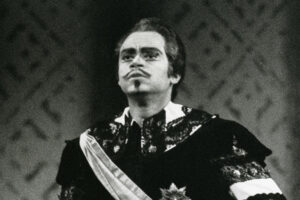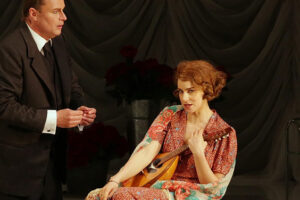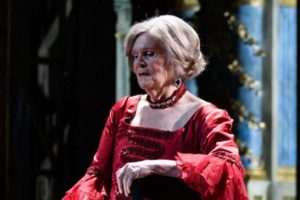

But, honestly, what made this moment so extraordinary is what preceded it. The recital featured two singers—Crocetto and baritone Zachary Nelson—but it was Crocetto whose singing had been more erratic, more memorable for its disconcerting inconsistency. In other words, before her encore (a jazzy rendition of a show tune) her singing seemed out of control and suffered from strange technical choices.
Beneath the muddle, an exquisite, radiant sound ached to be released, shimmering and warm. It surfaced every once in a while, but mostly in the middle voice, when the singer was not pursuing anything too arduous. Her inept technique did not serve her natural, unique abilities: her soprano wobbled; she struggled to finish certain phrases; her jaw shook; her intonation veered off course.
Her deficiencies became more unnervingly apparent as she ascended the scale, moving from a more gathered sound into a spread, forced shriek. To be clear, Crocetto has a beautiful instrument. However, over the course of the recital on Sunday, it became obvious that she doesn’t know how to use it—especially when attempting more difficult classical repertoire.
I understand that Crocetto just finished a string of Toscas in Pittsburgh, and before that she had jumped into Aida at Washington National Opera. A demanding schedule like this would take its toll on any young singer, and perhaps this accounts for her poor performance Sunday afternoon—maybe she’s just tired. But if that’s the case, then she needs to reconsider her technique and her recent choices in rep. She doesn’t seem to be stewarding her gifts responsibly.
I remember hearing the soprano for the first time when she was a Grand Finals Winner at the Metropolitan Opera National Council Auditions. It was an impressive showing. Since then she has debuted with auspicious opera companies all over the globe, launching an international career, offering roles such as Donna Anna in Don Giovanni, Liù in Turandot, and Elisabetta in Don Carlo. After yesterday’s recital, however, I don’t understand how she gets through these performances.
Crocetto’s first set was Petrarch Songs by Liszt. The artist was undoubtedly invested in the music—her dramatic and vocal commitments were clear. But her technical problems hindered her. This was true of her second set as well, four Rachmaninoff songs that displayed equal artistic investment and a potentially ravishing sound. And yet, she was burdened again by vocal deficiencies.
Zachary Nelson had a much easier time. With an affable persona that could turn starkly aggressive when necessary, he reminded me of the TV actor Corey Stoll. His baritone had a smoldering, molten quality to it when he invested his entire body into his singing, supporting properly with his breath. However, he had a troubling tendency to darken his already shady baritone, emitting an owlish hooting that some might have considered artistic.
His first set was a selection of Schubert songs from Schwanengesang: “Das Fischermädchen”; “Die Stadt”; “Am Meer”; “Der Doppelgänger”; and “Die Taubenpost.” He executed these elegant works with relative ease and, when called for, appropriate intensity. He brought an especially rugged, threatening quality to “Der Doppelgänger,” which was haunting.
For his second set, Nelson offered selections from Songs of Travel by Ralph Vaughan Williams, appropriate repertoire for Nelson’s manly baritone. His roguish charm and swaggering charisma served the text perfectly.
Crocetto and Nelson joined each other on stage for two duets. The recital’s first half ended with “Mira, d’acerbe lagrime” from Il Trovatore. It was exciting, but mostly because Crocetto’s arduously produced singing threatened to buckle under the score’s demands. She never crashed and burned, thankfully, but this was mostly due to her natural gifts.
The second half closed with “If I Loved You” from Carousel. The singers were unrehearsed and awkward. Neither Nelson nor Crocetto seemed invested in the scene’s dramatic components. They finished with an awkward hug, which deflated the erotic possibilities built into the material by the composer and lyricist. It was unfortunate. Although, it must be said that Nelson has all the makings of an ideal Billy Bigelow, if he masters his music and gets over his self-consciousness.
Nelson brought more of his romantic, virile charisma to his encore, another Rogers and Hammerstein classic, “Some Enchanted Evening.” Again, his lack of preparation was evident—he forgot the words—but it didn’t seem to matter in light of his charming personality and well-produced singing.
And, as I’ve already written, it was during her encore that one really got a sense of what Crocetto is capable of, the quality she can achieve when she deploys her talents in an appropriate manner. Here the wobble was gone, the intonation perfect, and she gave her self completely to the artistic task. I wonder if her high belting is affecting her more legitimate soprano? I’m not a voice teacher, so it’s not for me to say. But, I will say that, for the love of her voice, she has to figure it out. Her talent deserves the attention.
On the piano, Mark Markham was unremarkable. His playing had a lazy, Xanaxed quality, as if suffering from an overwhelming sense of ennui. It was only until Crocetto shifted gears with “Can’t Help Lovin’ Dat Man” that, like the soprano, one got a sense of what he’s truly capable of.
























Comments